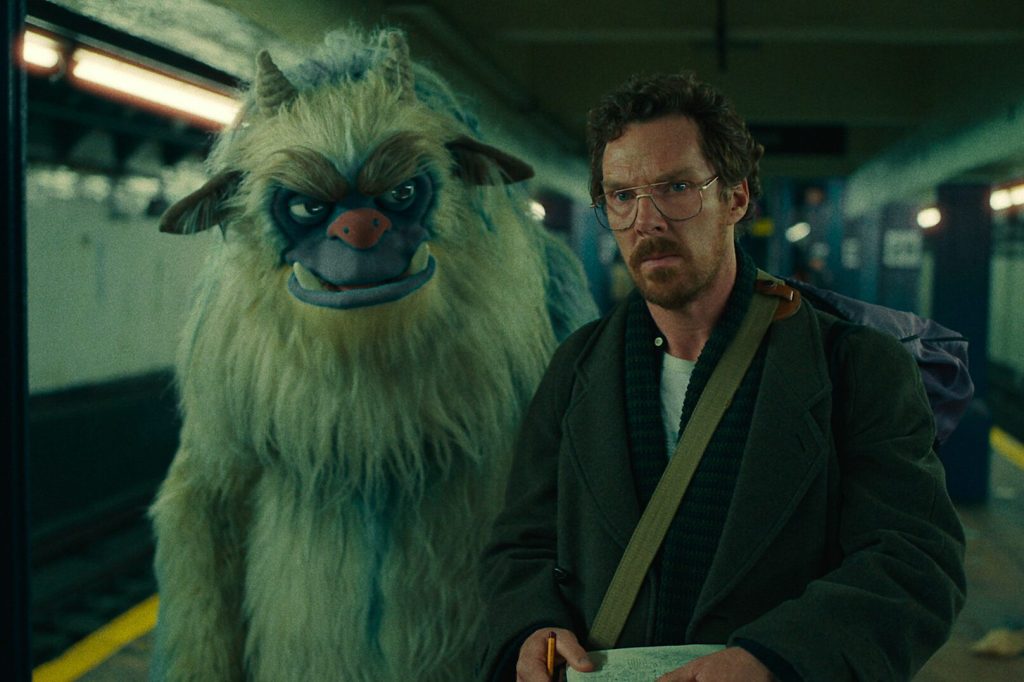The much-anticipated new Benedict Cumberbatch series on Netflix, Eric, initially sounds as if it could have been made at any point in the past four decades. Bankable leading man whose character is battling substance abuse issues and mental instability; check. Diverse supporting cast including at least one character who is not only struggling against racial prejudice but homophobia too, check. Gritty-yet-faintly exotic setting, in this case the pre-Giuliani New York of the Eighties, check.
But there is another element in Abi Morgan’s psychological thriller that throws a spanner in the works, in the form of the eponymous Eric. You might expect him to be the missing child whose father, demented with worry, is frantically searching the city for him, but instead Eric is none other than a seven-foot-high blue puppet, accompanying Cumberbatch’s character on his quest.
As you may have gathered from the above synopsis, Eric is considerably different from both Morgan’s previous work (which includes Steve McQueen’s Shame and the television-oriented drama The Hour) and most of what makes it onto television these days. Forget Bridgerton and its ilk, this is full-strength wackiness, removed from any need to conform to conventional ideas of what drama should or should not be, and refreshing as a result.
I may be alone in continuing to wonder whether Morgan’s 2015 drama Suffragette was originally intended — daringly — as a look at the suffragette movement from the perspective of the police who attempted to repress them, thus portraying the freedom fighters as terrorists, and was later massaged into something more acceptable by terrified studios. But there is no doubt that Eric represents a writer being allowed to follow her considerable imagination without interference to its furthest degree. Aided by Cumberbatch’s star power, this is the kind of thing that only Netflix could get away with.
It follows close behind Richard Gadd’s Baby Reindeer, which may end 2024 as the most unexpected hit of the year. Certainly, there has been nothing on Netflix since Squid Game to compare to it in terms of water-cooler discussion, although the extreme violence of the South Korean show was replaced by no less harrowing psychological trauma (and, if media reports from Britain are to be believed, a raft of lawsuits heading Netflix’s way from Fiona Harvey, the real-life inspiration behind the Martha character). Eric is too bizarre and too mannered to have the same impact as Baby Reindeer, and without wishing to spoil how the series develops, the initial esoterica that the show promises soon calms down into something altogether more conventional, even reassuring. If your child happened to stumble onto the show by accident, they would be appalled and terrified at first; by the end, they might even come to enjoy it.
Does this indicate that Netflix, for so long mired in playing it safe, is finally starting to take the kinds of risks that the leading streaming service in the world really ought to be embracing? I’ve found Ted Sarandos an irritating, even sacrilegious presence before, but there’s no doubt that he, or those around him, have realized that risk-taking and innovation are the only ways to get audiences talking about shows on streaming services that are based on original ideas rather than IP. (Gadd’s Edinburgh show, on which Baby Reindeer was based, does not count.) Eric might not be the best thing that will be on Netflix all year, but it’s certainly one of the most daring and unusual shows that has appeared so far in 2024, and this indicates that, while cinema is in the doldrums, television continues to be the place where the talented and ambitious can make their mark.






















Leave a Reply